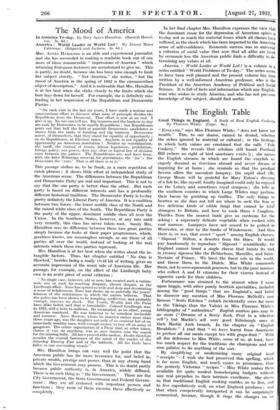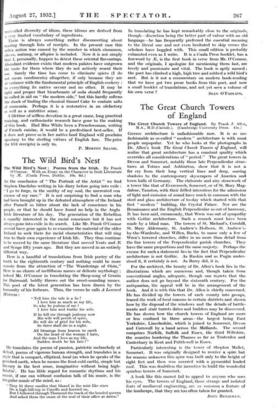The English Table
Good Things in England. A Book of Real English Cookery, By Florence White. (Cape. 6s.) "ENGLAND," says Miss Florence White, " does not know her wealth." This, to our shame, cannot be denied, whether the riches ignored be material or cultural ; or the heritage in which both values are combined that she calls " Folk Cookery." She reveals that ortolans still haunt Portland Bill (where no right of bird sanctuary exists !) ; she names the English streams in which are found the crayfish we eagerly demand as ecretrisses abroad and never dream of inquiring for at home ; she reminds us that the prodigal Severn offers the succulent lamprey, the sapid shad (Mr. George Moore will be grateful for Mary Eaton's dressing of a fish he, like myself, fondly imagined could only be enjoyed on the Loire), and sometimes royal sturgeon ; she tells us the southern counties in which Large Whites may perfume their bacon by grubbing up truffles. The only things to hearten us she does not tell are where to seek the four or five delicious kinds of edible fungi that cannot be total strangers to Britain, and how to cook them a ranglaise. Thistles from the nearest bank give us cardoons for the asking : a supremely delicate vegetable when cooked with veal marrow. Lampreys have not ceased to be potted in Worcester, or char by the banks of Windermere. And then there is, or was, that secret sport " among English cheeses, " Slipcoat " Stilton, a deserter from the blues. It would pay handsomely to reproduce " Slipcoat " scientifically, for England cannot boast a single cheese that bursts its rind in creamy ripeness like the Reblochons, Maroilles, and Saint- Necthire of France. We have the finest eels in the world, and throw them to the Dutch. Miss White commends them, not to over-squeamish gourmets, but to the poor maniacs who collect A and D vitamins for their viscera instead of cigarette cards for their children.
Forbearance was strained to the utmost when I came upon haggis, with other purely Scottish specialities, included among the " good things " that are England's, and failed to discover any mention of Miss Florence McNeill's now famous " Scots Kitchen " (which incidentally owes far more to the Vikings than the Valois) in Miss Florence White's bibliography of " authorities?' English mutton pies may be no more (" Dreams of a fleecy flock, Pent in a wheaten cell ") but Mackie's sell very good Edinburgh ones at their Marble Arch branch. In the chapter on " English Breakfasts " I read that " we have learnt from Americans to preface all our meals except tea with grape-fruit." With all due deference to Miss White, some of us, at least, have too much respect for the traditions she champions and our own palates to do anything of the sort.
By simplifying or modernizing many original local " receipts "—I wish she had preserved this spelling, which is far more English, and much easier to pronounce, than the genteely Victorian " recipes "—Miss White makes them available for quite modest housekeeping budgets without any real prejudice to their intrinsic excellence. She shows us that traditional English cooking enables us to live, and to live superlatively well, on what England produces ; and that when competently interpreted it can be surprisingly economical, because, though it rings the changes on an
unrivalled diversity of idiom, these idioms are derived froth a A-cry limited vocabulary of ingredients.
There is always something .rather disconcerting about reading through lists of receipts. In the present case this reflex action was caused by the number in which cinnamon, cloves, nutmeg, or allspice is included. Now it is not simply that I, personally, happen to detest these oriental flavourings. Abundant evidence exists that modern palates have outgrown the taste for them where they do not actively resent their use. Surely the time has come to eliminate spices (I do not mean condiments) altogether, if only because they are at variance with the fundamental principle of English cookery : to everything its native savour and no other. It may be right and proper that bicarbonate of soda should frequently he called in aid on " the modern side," but this hardly softens the shock of finding the classical Simnel Cake to contain salts of ammonia. Perhaps it is a restorative in an olefactory as well as a nutritive sense.
A lifetime of selfless devotion in a great cause, long practical training, and enthusiastic research have gone to the making of this book. Had Miss White been a Frenchwoman, writing of French cuisine, it would be a predestined best-seller. If it does not prove so in her native land England will proclaim apostasy to the sterling virtues of English fare. The price (for 853 receipts) is only 6s.
P. MORTON SHAND.



























 Previous page
Previous page